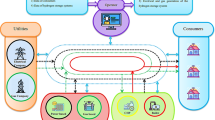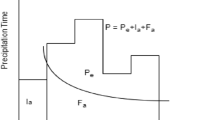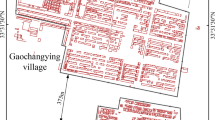Abstract
Ground source heat pumps (GSHP) give zero-carbon emission heating at a residential level. However, as the heat is discharged, the temperature of the ground drops, leading to a poorer efficiency. Borehole inter-seasonal thermal storage coupled with GSHP maintains the efficiency at a high level. To adequately utilize the high performance of combined GSHP and the borehole system to further increase system efficiency and reduce cost, such a combined heating system is incorporated into the interconnected multi-carrier system to support the heat load of a community. The borehole finite element (FE) model and an equivalent borehole transfer function are proposed and respectively applied to the optimisation to analyze the variation of GSHP performance over the entire optimisation time horizon of 24 h. The results validate the borehole transfer function, and the optimisation computation time is reduced by 17 times compared with the optimisation using the FE model.
Similar content being viewed by others
References
GOV.UK. Exploring how the UK can meet the 2050 emission reduction target using the web-based 2050 Calculator. 2018–06–22, https://doi.org/www.gov.uk/2050-pathways-analysis
Guan X H, Xu Z B, Jia Q S. Energy-efficient buildings facilitated by microgrid. IEEE Transactions on Smart Grid, 2010, 1(3): 243–252
Geidl M. Integrated modeling and optimization of multi-carrier energy systems. Dissertation for the Doctoral Degree. Zurich: ETH Zurich, 2007
Moeini-Aghtaie M, Abbaspour A, Fotuhi-Firuzabad M, Hajipour E. A decomposed solution to multiple-energy carriers optimal power flow. IEEE Transactions on Power Systems, 2014, 29(2): 707–716
Shabanpour-Haghighi A, Seifi A R. Energy flow optimization in multicarrier systems. IEEE Transactions on Industrial Informatics, 2015, 11(5): 1067–1077
Kienzle F, Ahcin P, Andersson G. Valuing investments in multienergy conversion, storage, and demand-side management systems under uncertainty. IEEE Transactions on Sustainable Energy, 2011, 2(2): 194–202
Geidl M, Andersson G. Optimal power flow of multiple energy carriers. IEEE Transactions on Power Systems, 2007, 22(1): 145–155
Huo D, Liu Y, Gu C H, Blond S L. Optimal flow of energy-hub including heat pumps at residential level. In: Power Engineering Conference, Stoke on Trent, UK, 2015
Korada N, Mishra M K. Grid adaptive power management strategy for an integrated microgrid with hybrid energy storage. IEEE Transactions on Industrial Electronics, 2017, 64(4): 2884–2892
Sun Q Y, Huang B N, Li D S, Ma D Z, Zhang Y B. Optimal placement of energy storage devices in microgrids via structure preserving energy function. IEEE Transactions on Industrial Informatics, 2016, 12(3): 1166–1179
Sanner B, Karytsas C, Mendrinos D, Rybach L. Current status of ground source heat pumps and underground thermal energy storage in Europe. Geothermics, 2003, 32(4–6): 579–588
Adamek F, Arnold M, Andersson G. On decisive storage parameters for minimizing energy supply costs in multicarrier energy systems. IEEE Transactions on Sustainable Energy, 2014, 5(1): 102–109
Shao C C, Wang X F, Shahidehpour M, Wang X L, Wang B Y. An MILP-based optimal power flow in multicarrier energy systems. IEEE Transactions on Sustainable Energy, 2017, 8(1): 239–248
Huo D, Le Blond S, Gu C, Wei W, Yu D. Optimal operation of interconnected energy hubs by using decomposed hybrid particle swarm and interior-point approach. International Journal of Electrical Power & Energy Systems, 2018, 95: 36–46
Arnold M, Negenborn R R, Andersson G, De Schutter B. Modelbased predictive control applied to multi-carrier energy systems. In: 2009 IEEE Power & Energy Society General Meeting, Calgary, AB, Canada, 2009
Moeini-Aghtaie M, Dehghanian P, Fotuhi-Firuzabad M, Abbaspour A. Multi-agent genetic algorithm: an online probabilistic view on economic dispatch of energy hubs constrained by wind availability. IEEE Transactions on Sustainable Energy, 2014, 5(2): 699–708
Sun Q Y, Han R K, Zhang H G, Zhou J G, Guerrero J M. A multiagent- based consensus algorithm for distributed coordinated control of distributed generators in the energy internet. IEEE Transactions on Smart Grid, 2015, 6(6): 3006–3019
Dou C X, Yue D, Han Q L, Guerrero J M. Multi-agent system-based event-triggered hybrid control scheme for energy internet. IEEE Access, 2017, 5(99): 3263–3272
Sheikhi A, Rayati M, Bahrami S, Mohammad Ranjbar A. Integrated demand side management game in smart energy hubs. IEEE Transactions on Smart Grid, 2015, 6(2): 675–683
Sheikhi A, Bahrami S, Ranjbar A M. An autonomous demand response program for electricity and natural gas networks in smart energy hubs. Energy, 2015, 89: 490–499
Bahrami S, Sheikhi A. From demand response in smart grid toward integrated demand response in smart energy hub. IEEE Transactions on Smart Grid, 2016, 7(2): 650–658
Sheikhi A, Rayati M, Bahrami S, Ranjbar A M, Sattari S. A cloud computing framework on demand side management game in smart energy hubs. International Journal of Electrical Power & Energy Systems, 2015, 64: 1007–1016
Kennedy J, Eberhart R. Particle swarm optimization. In: IEEE International Conference on Neural Networks, Perth,WA, Australia, 1995
Bozchalui M C, Hashmi S A, Hassen H, Canizares C A, Bhattacharya K. Optimal operation of residential energy hubs in smart grids. IEEE Transactions on Smart Grid, 2012, 3(4): 1755–1766
Houwing M, Negenborn R R, De Schutter B. Demand response with micro-CHP systems. Proceedings of the IEEE, 2011, 99(1): 200–213
ofgem. About the domestic renewable heat incentive (RHI). 2018–06–22, https://doi.org/www.ofgem.gov.uk/environmental-programmes/domestic-rhi/about-domestic-rhi
Clean Energy Prospector UK Ltd. Owen square community energy project. 2018–06–22, https://doi.org/www.cepro.co.uk/2015/04/choices-solar-district-heat-study/
Mendis N, Muttaqi K M, Sayeef S, Perera S. Application of a hybrid energy storage in a remote area power supply system. In: Energy Conference and Exhibition, Manama, Bahrain, 2011
Ebbesen S, Kiwitz P, Guzzella L. A generic particle swarm optimization Matlab function. In: 2012 American Control Conference, Montreal, QC, Canada, 2012
Richardson I, Thomson M, Infield D, Clifford C. Domestic electricity use: a high-resolution energy demand model. Energy and Building, 2010, 42(10): 1878–1887
Yao R M, Steemers K. A method of formulating energy load profile for domestic buildings in the UK. Energy and Building, 2005, 37(6): 663–671
Li R, Wang Z M, Le Blond S, Li F R. Development of time-of-use price by clustering techniques. In: 2014 IEEE PES General Meeting, National Harbor, MD, USA, 2014
Acknowledgements
This work was supported by the CHOICES project of the UK Department of Environment and Climate Change.
Author information
Authors and Affiliations
Corresponding author
Rights and permissions
About this article
Cite this article
Huo, D., Wei, W. & Le Blond, S. Optimisation for interconnected energy hub system with combined ground source heat pump and borehole thermal storage. Front. Energy 12, 529–539 (2018). https://doi.org/10.1007/s11708-018-0580-0
Received:
Accepted:
Published:
Issue Date:
DOI: https://doi.org/10.1007/s11708-018-0580-0




